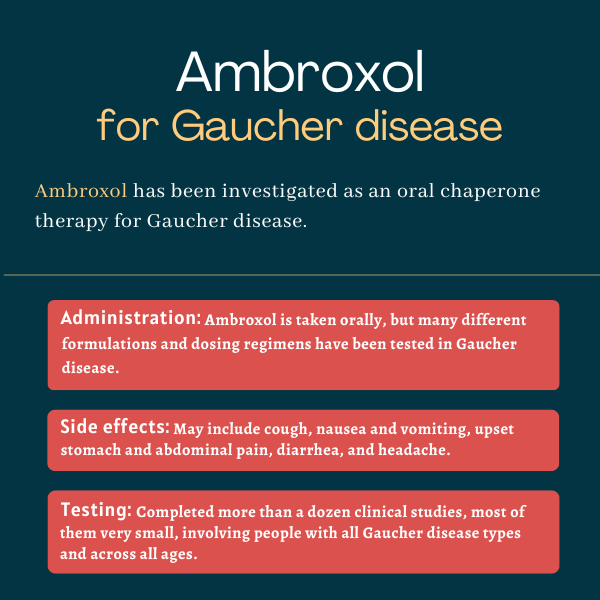
Ambroxol hydrochloride for Gaucher disease
Last updated April 30, 2025, by Marisa Wexler, MS

What is ambroxol for Gaucher disease?
Ambroxol is an experimental chaperone therapy that may help ease both neurological and non-neurological symptoms of Gaucher disease. It may be used alongside standard therapies or as an alternative when those therapies are not accessible or effective.
Though not approved in the U.S., ambroxol is widely available in many countries as an over-the-counter medication used to clear mucus and relieve cough. In such regions, the oral therapy is sometimes prescribed off-label for Gaucher disease.
Gaucher disease is caused by genetic mutations that interfere with the function or production of glucocerebrosidase (GCase), an enzyme needed to break down certain fatty molecules. Without enough functional GCase, these molecules build up inside cells and damage certain organs and tissues over time, ultimately driving the symptoms of Gaucher disease.
Many Gaucher-causing mutations lead to the GCase enzyme being misfolded, or acquiring the wrong three-dimensional shape, which prevents it from working properly.
Ambroxol is believed to act as a chaperone that helps the faulty enzyme fold correctly, allowing it to function more normally. This also stabilizes the enzyme and prevents its premature degradation, ensuring enough GCase reaches the lysosomes — cellular compartments where the enzyme carries out its function.
One unique feature of ambroxol is its ability to cross the blood-brain barrier, a semipermeable membrane that controls which substances can enter the brain from the bloodstream. Approved Gaucher disease treatments cannot pass through this barrier, making them ineffective at addressing the neurological symptoms that are a hallmark of Gaucher types 2 and 3. Ambroxol’s ability to reach the brain thus makes it an attractive treatment option for patients with neurological complications.
Several small clinical studies have tested ambroxol in people with all types of Gaucher disease. While data are still limited, findings have encouraged doctors and patients in some countries to consider its off-label use, either in combination with enzyme replacement therapy or substrate reduction therapy, or as an alternative to these medications when they are not available, affordable, or effective.
Therapy snapshot
| Treatment name: | Ambroxol |
| Administration: | Available in multiple oral formulations |
| Clinical testing: | Tested in several small studies involving children and adults with Gaucher disease |
How is ambroxol administered in Gaucher disease?
Ambroxol is available in multiple oral formulations, including syrup, tablets, soft pastilles, oral granules, and a solution. It also exists as immediate-release oral forms, which last shorter periods in the bloodstream, and as extended-release forms, which may be taken once per day.
Because the drug is not specifically formulated or approved for Gaucher disease, there is no standardized dosing regimen for its use in those patients.
Most studies investigating ambroxol for Gaucher disease have used weight-based dosing, but doses have varied widely. Some studies tested relatively low doses, such as 1.5 milligrams of ambroxol per kilogram of body weight (mg/kg) per day, while others went as high as 30 mg/kg per day. Some studies used fixed doses of ambroxol, but again these also tested a wide range of doses — from 75 to 1,485 mg per day.
Ambroxol remains an experimental therapy for Gaucher and its optimal dose and duration of treatment remain unclear. Dosing decisions are typically made on a case-by-case basis by clinicians experienced with the condition.

Ambroxol in Gaucher clinical trials
The effects of ambroxol in Gaucher disease have been tested in at least 14 clinical trials and studies, many of which involved people with Gaucher disease type 2 or 3, for whom current treatments are largely ineffective in managing neurological complications.
Findings have generally supported its use as a pharmacological chaperone therapy. Across these studies, ambroxol has been shown to increase the activity of the GCase enzyme and reduce the accumulation of the fatty molecules that drive disease symptoms.
Ambroxol also helped ease a range of Gaucher symptoms, including reducing liver and spleen enlargement, increasing blood cell counts and bone density, and reducing fatigue and pain. Some studies also suggest that ambroxol improved neurological status and slowed the progression of neurological symptoms in some patients.
Despite the promising results, available data on ambroxol in Gaucher disease have several limitations. For example, most studies were small, collectively involving fewer than 150 patients. In addition, there was significant variation across studies and most lacked control groups, making it difficult to distinguish treatment effects from placebo effects or natural disease variability.
Larger and well-controlled studies are now needed to confirm ambroxol’s benefits, determine optimal dosing regimens, and identify which patients are most likely to benefit from the therapy.
Common side effects of ambroxol
In clinical studies involving people with Gaucher disease, ambroxol has generally been well tolerated, with most side effects being mild and resolving with treatment discontinuation. The most commonly reported side effects include:
- cough
- nausea and vomiting
- upset stomach and abdominal pain
- diarrhea
- headache.
In rare cases, ambroxol has been associated with allergic reactions and changes in blood markers among Gaucher patients. Careful monitoring may be needed, particularly in patients receiving high doses of the medication for a long period of time.
Gaucher Disease News is strictly a news and information website about the disease. It does not provide medical advice, diagnosis, or treatment. This content is not intended to be a substitute for professional medical advice, diagnosis, or treatment. Always seek the advice of your physician or other qualified health provider with any questions you may have regarding a medical condition. Never disregard professional medical advice or delay in seeking it because of something you have read on this website.
Recent Posts
- Noninvasive test may help monitor liver health in type 1 Gaucher disease
- When being ready isn’t the only requirement for pregnancy
- Gaucher disease linked to changes in cell energy and fat processing
- Gene therapy keeps Gaucher patients off standard treatment for up to 2 years
- The things I wish I’d known after my Gaucher disease diagnosis



